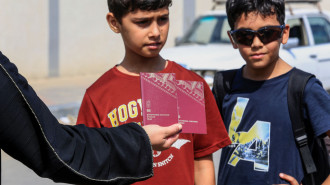Torrential rains in Sudan's Darfur worsens 'one of the world's worst humanitarian crises'
In recent weeks, grim living conditions endured by thousands in Sudan's Darfur, many of whom have fled to the province from fighting across the country and are facing famines and diseases, have been exacerbated by torrential rains.
Floods have swept through a number of areas in the Darfur region, displacing thousands, damaging hundreds of homes and cutting off essential supplies to a beleaguered population, after heavy seasonal rains filled the valleys and waterways over the past weeks.
In the whole of Sudan, at least 75 people have been killed, and over 164,000 people were affected by the floods in 11 states, most of them in the Red Sea and West Darfur states, according to the United Nations humanitarian agency, OCHA, with more than 14,340 homes destroyed, resulting in the displacement of more than 27,000 people.
Darfur, which is already facing high risks of famine amidst ongoing fighting and limited access to humanitarian items, is one of the worst-hit regions. On 6 August, the Darfur Network for Human Rights urged local authorities and international organisations to immediately provide temporary housing for thousands of displaced people, as well as food and water for those affected by the floods, and called on health emergency teams to intervene to save victims from health disasters awaiting them resulting from the floodwaters.
"Water is trapping residents, and roads leading to the city hospital have become impassable, making access to medical care even more difficult," said the statement.
Since then, things have got much worse, Abdullah Al-Taher, a member of the emergency room in the Ardamata region in West Darfur state, told The New Arab.
"In a span of days, 4,657 families have been impacted, with 575 houses collapsing across the region," he said, noting that the numbers keep rising continuously. "The torrential rain swept through the Kaja Valley, drowning the region. The Erdamata's neighbourhood of Al-Rusafa, is mostly wiped out, as well as Al-Jabal, Al-Jazeera, Al-Jarif, Al-Nasr and many more. Over 300 houses were erased in these areas," he added.
Eyewitnesses say swaths of land are completely immersed beneath muddy water, tunnels completely flooded, infrastructure like bridges damaged and houses of bricks demolished.
Al-Taher revealed that some families affected by the floods were being hosted at the El Geneina Airport rest house and some citizens’ homes in New Hilla, whose owners were displaced in the war.
And amidst all this, Al-Taher pointed out that the assistance this population got is close to nil. "The aid they received from Sudan's Red Crescent was nothing but sacks of corn that weren’t even enough to feed half of those affected," he explained. "Instead, initiatives of youth are stepping in to provide whatever assistance they can, including groups in Al-Jazeera, Al-Maqtaa and Erdamata. Otherwise, the Red Crescent has basically left people to their own," he criticised.
A crisis made worse by fighting
The ongoing war is also worsening the handling of the crisis as the fighting between feuding parties, the Rapid Support Forces (RSF) and Sudan's Armed Forces (SAF), is risking lives.
According to an official at the Ministry of Urban Development and Infrastructure, who asked not to be named out of fear of reprisal, the central government conducted maintenance of barriers and trenches in the West Darfur's capital of El Geneina city on an annual basis, to help reduce the impact of the Autumn rains and the flooding impact on Kaja Valley which spills into the city. However, the official said that the murder of its governor Khamis Abkar in November and the RSF’s takeover of the city meant that such essential work was not done this year, exacerbating the effect of the floods.
The result has been horrifying. Whole neighbourhoods in El-Geniena are flooded, according to NGOs, and roads linking it to other locals were destroyed, subjecting its population to complete isolation, and therefore the cutting of all essentials. The RSF's local government of West Darfur, headed by Adam Karshoum, said that around 7,000 houses were demolished by the rains, and called for international relief organisations to provide support.
Furthermore, Doctors Without Borders said in a statement early August that the collapse of Bari Valley Bridge, which connected West Darfur with southern and central Darfur, means that the only safe path for humanitarian aid to get through to people in need is demolished, further worsening a dire situation. Meanwhile, the UN said that "relief supplies for the camp are also readily available in eastern Chad, but heavy rains have flooded the Tine crossing—the only cross-border route open to humanitarians after the Sudanese authorities revoked permission for the use of Adre crossing in February."
As a result of the destruction of infrastructure, trucks loaded with essentials and basic needs were unable to cross between the various parts of the province, especially amidst increased fuel prices which further add strain on transportation.
Member of El-Geniena emergency room, Al-Zahawi Edris, said that the floods forced the RSF to reopen several hospitals and medical centres which were previously kept to serve the wounded in their ranks.
"The hospitals are operating at a 20 percent capacity because of the severe shortage in healthcare workers, absence of medications and examination kits," Edris told TNA. "In Ardamata, the only hospital is shut down since the region was captured by the RSF. If it isn't for a small number of medical units with emergency room volunteers, people there wouldn’t get medical care," he concluded.
This article was published in collaboration with Egab.
![Houses damages from flooding in Darfur. [Courtesy of Ismail Mohamed]](/sites/default/files/styles/large_16_9/public/2024-08/Courtesy%20of%20Ismail%20Mohamed%20.jpg?h=fdc08032&itok=C13PX4ee)



 Follow the Middle East's top stories in English at The New Arab on Google News
Follow the Middle East's top stories in English at The New Arab on Google News


![The US vetoed a UN Security Council (UNSC) resolution demanding a ceasefire in Gaza [Getty]](/sites/default/files/styles/image_330x185/public/2185152251.jpeg?h=7ef8ac04&itok=RpLSj2pu)